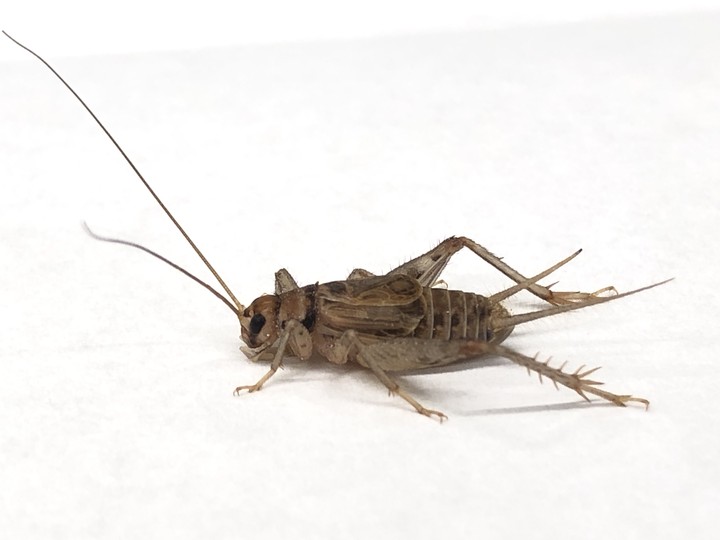Insect farming for food and feed
 Adult male Gryllodes sigillatus
Adult male Gryllodes sigillatus
Introduction
The global demand for protein is expected to increase with a growing population. Current farming practices are expected to fall short of meeting this demand. The problem is to find alternative sources of protein that can scale with a growing global population, while also being sustainable and space-efficient. Insect farming is a promising solution to provide a sustainable source of protein. The challenge for farming operations is to improve the scalability and output to meet the growing demand for alternative protein.
One way to improve the output of a farm is to increase the yield of a harvest. To this end, the life history traits of an insect, as well as the biotic and abiotic conditions of the farm form avenues of exploration to increase yield through experimental manipulation of these variables. This project will quantify how changes in biotic and abiotic conditions affect farming output, identify optimal values that maximise yield, and evaluate how to translate experiments to a farm with a focus on crickets for human consumption. These results will inform farming practices for a growing population.
This is a NSERC-Mitacs Alliance grant awarded to Heath MacMillan and Susan Bertram at Carleton University.
Symposia
I have organised two symposia as part of this project:
International Congress of Entomology 2024
This symposium was about using physiology in insect mass-rearing practice at the International Congress of Entomology in Kyoto, Japan.
Rearing insects en masse is crucial for numerous industries. Mass reared insects are used for releases related to pollination, disease control, conservation or pest management, and for food and feed production and waste processing. Physiological performance underpins the quantities and qualities of insects necessary for success in mass rearing programs. In turn, performance gains and deficits depend on biotic and abiotic factors like diet, temperature, social environments, and disease (e.g. viruses). We will connect experts working on various modulators of performance across as many applications as possible and showcase how insect physiology can be leveraged to optimise mass rearing.
Entomological Society of Canada 2024
This symposium was about interdisciplinary approaches to insect mass rearing at the Entomological Society of Canada Annual Meeting in Quebec City, Canada.
Rearing insects en masse is crucial for numerous industries, including biocontrol agents for pest management, laboratory populations, and the insects as food and feed sector. Academic institutions, industrial companies, and government all feed into the sustained development of the industry through improvements to the farming process, the development of policy and regulations, and ensuring there is enough supply to meet demand for insect agriculture. Recent advances in our understanding of fundamental insect biology and the rapid development and adoption of emerging technologies have also poised the insect mass rearing industry for rapid growth in Canada. Examples include monitoring of biotic and abiotic conditions to leverage our developing understanding of insect growth and development, machine learning and automation for collecting large quantities of data and reducing dependence on manual labour, and the development of sustainable practices. Thus, insect mass rearing relies on collaborative interdisciplinary partnerships to drive advancements, but these partnerships are not always established, and communication between relevant mass-rearing enterprises can be minimal. This symposium will be an integration of experts from academia and industry working on various aspects of insect mass rearing with the goals of showcasing recent advances in the Canadian insect mass-rearing industry and developing a roadmap for better implementation of policy and collaboration.
